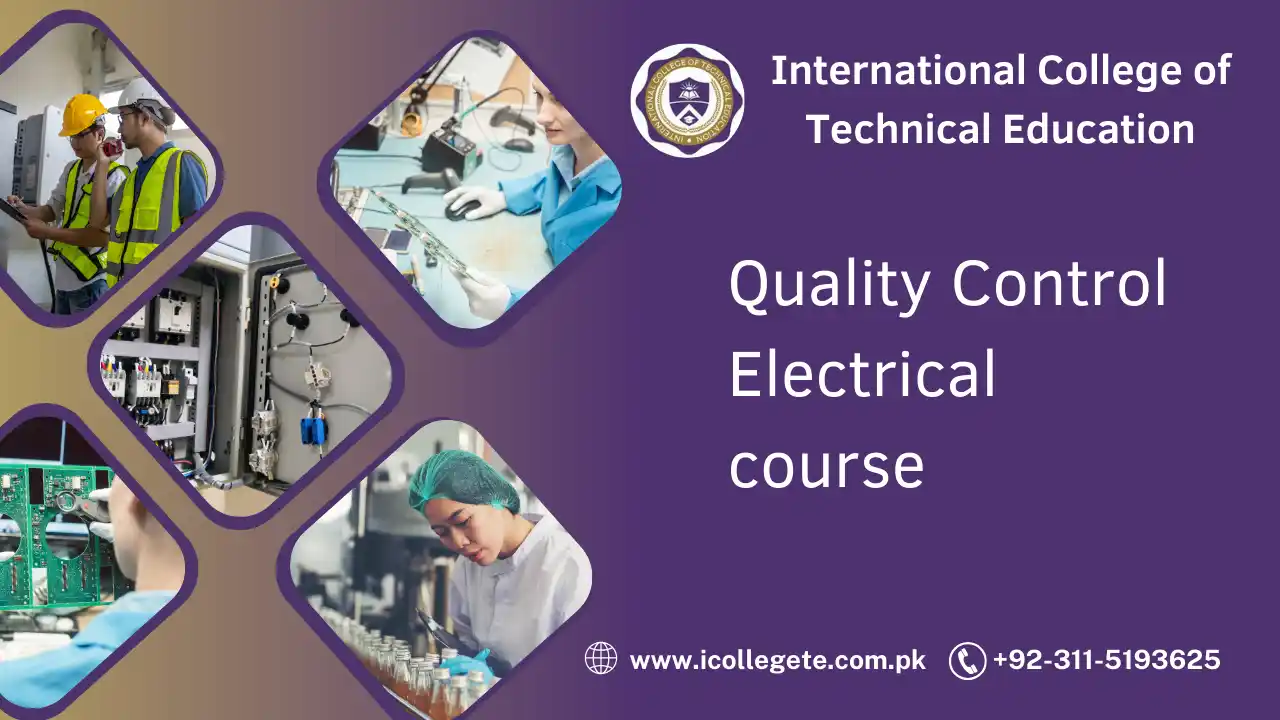In the fast-paced world of electrical engineering, maintaining high-quality standards is crucial for the safety, reliability, and efficiency of electrical systems. Whether it’s in the design, installation, or maintenance of electrical equipment and infrastructure, ensuring that each component meets the required quality standards is vital for avoiding costly mistakes, system failures, and even hazards. The Quality Control Electrical course in Sialkot offers a specialized program for individuals looking to gain the expertise needed to manage and maintain quality control processes in the electrical engineering field.
Sialkot, a hub for industry and manufacturing, is also becoming a center for educational programs in various engineering fields, including electrical engineering.
The Quality Control Electrical course in Sialkot is designed for individuals who want to develop a deep understanding of quality management techniques specific to the electrical engineering sector. The course provides students with the skills and knowledge required to monitor and control the quality of electrical components, systems, and processes. It covers essential aspects of quality control such as testing, inspection, standards compliance, and troubleshooting in electrical systems.
In an industry where safety and performance are paramount, this course equips students with the tools to ensure that electrical systems are functioning as intended and comply with local and international quality standards. From understanding electrical codes to implementing rigorous testing procedures, this course provides comprehensive training for a career in electrical quality control.
Course Overview
The Quality Control Electrical course focuses on the methodologies and techniques used in the electrical engineering industry to maintain and improve the quality of electrical systems. Students will gain both theoretical knowledge and practical experience, ensuring they are prepared for real-world applications. The course covers a range of topics from understanding electrical components, inspection procedures, and quality control systems to applying testing methods for electrical systems, circuits, and installations.
Students will also learn about the latest industry standards, regulatory requirements, and the tools used for electrical quality control, such as testing instruments and quality management systems. By the end of the course, students will have a well-rounded understanding of quality assurance in electrical systems and be ready to take on roles that focus on quality in the electrical engineering field.
Study Units
The Quality Control Electrical course in Sialkot consists of the following key study units:
- Introduction to Electrical Quality Control
- Understanding quality control principles in electrical engineering
- The importance of quality control in electrical systems and equipment
- Overview of quality management systems (QMS) in electrical engineering
- Electrical Components and Materials
- Properties and standards of electrical components (wires, transformers, circuit breakers, etc.)
- Understanding material specifications and performance criteria
- Quality control in electrical materials procurement and storage
- Testing and Inspection of Electrical Systems
- Methods of testing electrical circuits and systems
- Safety checks and procedures for electrical installations
- Electrical testing equipment (multimeters, insulation resistance testers, etc.)
- Electrical Codes and Standards
- National and international electrical codes (NEC, IEC, etc.)
- Regulatory standards for electrical installations and maintenance
- How to ensure compliance with electrical safety codes and quality regulations
- Troubleshooting and Problem Solving in Electrical Systems
- Identifying faults and inefficiencies in electrical systems
- Techniques for troubleshooting and repairing electrical systems
- Root cause analysis and corrective actions
- Quality Assurance in Electrical Projects
- Implementing quality assurance protocols in electrical projects
- Documenting quality checks and ensuring proper reporting
- Managing electrical project quality control from start to finish
- Use of Automation and Digital Tools in Electrical Quality Control
- Introduction to digital tools and software for electrical testing and monitoring
- The role of automation in improving electrical quality control
- Smart meters, sensors, and IoT in electrical systems
- Emerging Trends in Electrical Quality Control
- Innovations in electrical engineering and quality control
- The future of electrical systems: smart grids, renewable energy, and electric vehicles
- The impact of technological advancements on quality control in electrical engineering
Learning Outcomes
Upon successful completion of the Quality Control Electrical course, students will be able to:
- Understand the core principles of quality control in electrical engineering and apply them to electrical systems.
- Implement quality control measures for electrical components, circuits, and systems to ensure safety and efficiency.
- Conduct thorough inspections, testing, and troubleshooting to identify defects or inefficiencies in electrical installations.
- Navigate and apply national and international electrical codes and standards for compliance in electrical projects.
- Utilize industry-standard tools and techniques for electrical testing, including multimeters, insulation testers, and automated monitoring systems.
- Manage and document quality control processes in electrical projects, ensuring continuous improvement and regulatory compliance.
- Stay up-to-date with emerging technologies in electrical quality control, such as automation, IoT, and digital tools.
Course Benefits
- Comprehensive Knowledge: The course provides in-depth knowledge of quality control in electrical engineering, preparing students to handle all aspects of quality assurance, from inspection to compliance.
- Practical Experience: Students gain hands-on experience with the tools and techniques used in the field, ensuring that they can immediately apply their knowledge to real-world electrical systems and projects.
- Industry-Relevant Skills: The course aligns with industry standards and regulations, ensuring that students are equipped with the latest practices and methodologies used in electrical quality control.
- Improved Safety and Efficiency: By mastering quality control techniques, students will be able to ensure the safety, reliability, and efficiency of electrical systems, helping to prevent costly errors, system failures, and accidents.
- Career Advancement: With specialized skills in electrical quality control, graduates will enhance their job prospects in a variety of roles, including quality control engineers, electrical inspectors, and project managers.
- Global Opportunities: As quality control is a global necessity in the electrical industry, the skills gained in this course are applicable worldwide, providing graduates with international career opportunities.
Who is This Course For?
The Quality Control Electrical course in Sialkot is perfect for:
- Electrical Engineers: Professionals working in electrical engineering who want to specialize in quality control and improve their expertise in electrical systems management.
- Electrical Technicians: Technicians who work with electrical systems and installations and wish to develop their knowledge of quality control techniques.
- Quality Assurance Professionals: Individuals in quality assurance roles who want to expand their knowledge of electrical systems and how quality control principles apply to the electrical sector.
- Fresh Graduates: Recent graduates from electrical engineering or related fields who are looking to gain specialized knowledge and improve their employability in electrical quality control roles.
- Project Managers: Managers overseeing electrical projects who need to understand quality assurance and control processes to ensure the success and safety of their projects.
- Entrepreneurs: Those interested in starting electrical businesses or consulting firms who wish to implement strong quality control processes from the outset.
Future Progression
After completing the Quality Control Electrical course in Sialkot, students can pursue a range of career paths, including:
- Quality Control Engineer: Overseeing the quality assurance and control processes in electrical projects.
- Electrical Inspector: Inspecting electrical installations to ensure compliance with safety and quality standards.
- Electrical Project Manager: Managing electrical projects, ensuring that quality control measures are implemented throughout the project lifecycle.
- Testing and Calibration Specialist: Specializing in the testing and calibration of electrical systems and equipment.
- Compliance Officer: Ensuring electrical systems and installations comply with national and international quality standards and regulations.
Additionally, students can pursue further qualifications in ISO 9001 (quality management), Six Sigma (for process improvement), or Lean Manufacturing to advance their careers in electrical quality control. Higher-level studies in Electrical Engineering, Project Management, or Industrial Engineering are also excellent options for those seeking to progress to senior management or specialized roles.
the Quality Control Electrical course in Sialkot is a valuable program for individuals looking to specialize in electrical quality control and ensure that electrical systems meet the highest standards of safety, reliability, and performance. With a blend of theoretical knowledge and practical skills, this course prepares students for a rewarding career in the electrical engineering industry. If you are looking to improve your expertise in quality control and gain industry-relevant skills, this course is the ideal choice.







